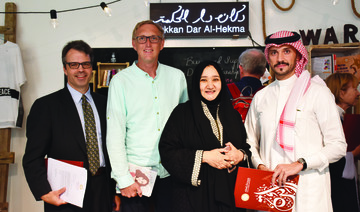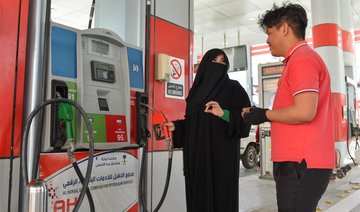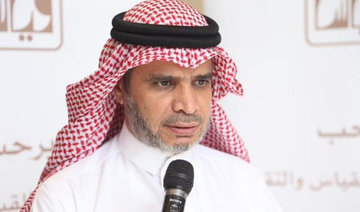RIYADH: One of the social stereotypes in Saudi society is that female entrepreneurs should work only in the beauty or fashion sectors owing to Saudi women’s huge awareness of the latest fashion trends and beauty tips.
However, Saudi women have started to see the unlimited potential in all business areas. The secret is to have the determination, passion and bravery to enter a new area and prove themselves, as they prove the added value of their businesses to society and to future generations as well.
Arab News has met three Saudi female entrepreneurs who went beyond these expectations. Not only this, but they have succeeded in planting their feet strongly in the market.
Our first story is of a female entrepreneur who went completely out of her comfort zone. She did much more than disprove the idea that a female entrepreneur can only work in the beauty sector.
 Bdoor Abdulla, 27, had essential tremor (a nerve disorder characterized by uncontrollable shaking) since she was very young. Her hands have never been stable; at best she can reduce the intensity of the shaking. She had a mission to deliver and a stereotype to break.
Bdoor Abdulla, 27, had essential tremor (a nerve disorder characterized by uncontrollable shaking) since she was very young. Her hands have never been stable; at best she can reduce the intensity of the shaking. She had a mission to deliver and a stereotype to break.
She was told she would never be able to use her hands properly for writing, cooking, or even wearing certain clothes, and she was underestimated by all her colleagues. Her teachers had pressured her to write properly without knowing that she had this disease and had been misdiagnosed.
“I suffered a lot because of misdiagnosis. My teachers used to pressure me to enhance my handwriting, and I did the same to myself — I pressured myself to practice handwriting. Then I realized that my health got much worse when I pressured myself,” Bdoor said.
“As a result I could not enhance my handwriting. It had exhausted me and lowered my confidence.” After a long journey to reach inner peace, Bdoor started to understand herself, and her skills and capabilities.
“I adore business, mathematics, finance and marketing. I read lots of books on these subjects; I went for online courses and workshops. I also enjoyed long hours watching TEDx Talks to get inspired and motivated.
“People around me enjoyed making fun of everything I like. The most common sarcastic question I was asked was: ‘How can a person who is unable to hold a pen and write understand figures and think of business?’ Frankly, that question was my main inspiration to go on and prove the opposite,” she said.
Bdoor could not go to university because of her grades, but she never lost hope. She used every moment to improve herself. “I decided to become an entrepreneur, I adore handicrafts. It was hard to make them because of my health, and this was the mission I wanted to deliver. A person who was unable to hold a pen is now able to make challenging handicrafts. Nothing can stop a human being from becoming what they want to be, even their health status,” Bdoor said.
“I participated in lots of exhibitions and bazaars. I expanded my community. I joined business workshops and sessions; I enjoyed everything in the process. It was a life to me ”
After making money through becoming a handicraft entrepreneur, Bdoor decided to extend her role in society by conducting media campaigns, YouTube videos, social media content, and public speaking to increase awareness about her disorder. “I still have more to contribute, and I will give as much as I have air in my lungs,” she said.
The second story is of Reema Awadh, who has owned a factory, “Alwarefah,” for recycling plastic since 2016, This field is considered new not only to Saudi women but to men also.
She has an interest in the environment and its protection. Each time she traveled abroad and saw how some countries — Canada, for example — take care of recycling but in Saudi Arabia there is much less care.
“I read a lot and search while traveling to European countries,” she said. “When I came to Saudi Arabia, I asked myself why there is no strong waste-sorting and recycling industry as in other top countries. It is essential,” she said.
Awadh did not waste a minute. She asked about the process factories went through, the mechanism and the pricing of a recycled substance or material. “I did not expect myself to fully engage in this. Throughout my field research I didn’t find any Saudi person working in this. I learned more about the buying and selling resources and started to identify the shortcomings in the market.”
She attended conferences. And when she decided to open her factory, it was not hard because she had has one business before in finishing and following up governmental paperwork for businesses. She started with one small truck and then gradually expanded. She got equipment, trucks for recycled plastic, tools, a workforce. She learned more and more and became fully engaged as she spent more time in this field.
When asked about why she did not have a beauty-related business like the majority, she said: “My first business was to follow up governmental paperwork for business and facilities’ establishment. That made me aware of the type of challenges that could face female entrepreneurs in this area. Besides, I am a highly active person who enjoys movement and field work more than the traditional office setting.
“Moreover, I believe that any business owner must have a related skill to her/his business. I had no skill in this area and I was not into it in the first place. Plastic recycling was my ultimate passion.
“My dream is to get a share in SABIC (a diversified manufacturing company). I want to deal with more facilities. I believe that the future will be much brighter. The municipality is having a new project, ‘a district without garbage,’ to sort containers. Governmental entities have excessive plastic products. All of this presents opportunities and I am looking forward to further cooperation with authorities in concerns such as the municipality.”
The third example is Sarah Aldosary, CEO and founder of Koun Makerspace. Her story began when she graduated in information technology. Then she had a traditional job at King Abdulaziz City for Science and Technology for nearly four years.
“Then I joined the National Satellite Technology Center as a supervisor of a group of female employees. During that time the idea emerged globally of maker spaces and fab labs (fabrication laboratories). One of my dreams was to have a business in which I could feel exceptionally energized every single day.
“I also got excited because there was a governmental tendency to support such innovative ideas. I decided to create a maker space for women only, to provide them with workshops and courses to increase their awareness about this area, since it was absolutely new to our society.”
After creating a good number of clients, she officially started providing digital fabrication services. “My services were to manufacture prototypes for new products and also to cover students’ projects that required digital fabrication. It can be done through 3D printers, lasers, CNC routers.”
Sarah believes her role does not stop at reaching that kind of success. She believes her role extends to empowering youth. “I depend on national capabilities in my business because Saudis have proven themselves in innovation and creativity.
“I dream of expanding in my businesses in terms of services and offices to cover bigger targets. I also believe that our Saudi youth is completely able to export technology, not only to consume it. And I will try to reinforce this any way I can,” she concluded.



























